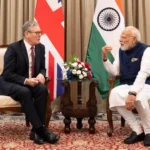
UK Prime Minister Keir Starmer has embarked on a two-day visit to India, aiming to reinforce trade, investment, and bilateral relations following the recently signed UK-India trade pact. Accompanied by senior officials, business leaders, and representatives from academia and cultural sectors, the visit is designed to deepen collaboration across multiple domains, including technology, defense, renewable energy, and education.
During his visit, Starmer is scheduled to meet key government officials, industry leaders, and startup founders to discuss avenues for enhancing trade and investment. The discussions are expected to focus on increasing bilateral trade volumes, streamlining regulatory frameworks, and identifying joint ventures and strategic partnerships in emerging sectors such as AI, green energy, fintech, and manufacturing.
The visit underscores the UK’s strategic interest in India as one of the fastest-growing major economies in the world. Trade between the two countries has grown steadily in recent years, and the newly signed trade pact aims to remove barriers, simplify customs procedures, and promote mutual investment. Starmer’s presence in India signals a commitment to making these agreements operational and ensuring tangible benefits for businesses on both sides.
In addition to trade and investment, the UK delegation is also emphasizing education and research collaboration. Several UK universities have expressed interest in expanding partnerships with Indian institutions to enhance academic exchange, research initiatives, and skill development. Such collaborations are expected to provide long-term benefits by creating a talent pipeline capable of supporting advanced industries in both countries.
Cultural and people-to-people ties are also on the agenda. Starmer is expected to engage with Indian communities in the UK and India, highlighting shared heritage and mutual opportunities in arts, sports, and creative industries. These engagements aim to strengthen diplomatic relations while creating goodwill that facilitates smoother business collaboration.
Market analysts suggest that the visit could positively impact investor sentiment, as it reinforces confidence in policy stability and the commitment of both governments to fostering business-friendly environments. Companies in sectors such as defense manufacturing, technology, and renewable energy are particularly attentive, anticipating potential joint ventures and technology transfers.
The Prime Minister’s visit comes at a time when global supply chains are shifting, and countries are seeking to diversify trade partners. India, with its growing consumer base, skilled workforce, and strategic location, presents significant opportunities for UK businesses looking to expand abroad. Likewise, Indian companies view the UK as a gateway to European markets, making the visit mutually beneficial.
In conclusion, UK PM Keir Starmer’s India visit represents a strategic effort to strengthen economic, educational, and cultural ties. By promoting trade agreements, investment partnerships, and research collaborations, the visit is expected to enhance bilateral relations while opening new avenues for growth, innovation, and collaboration across multiple sectors.
